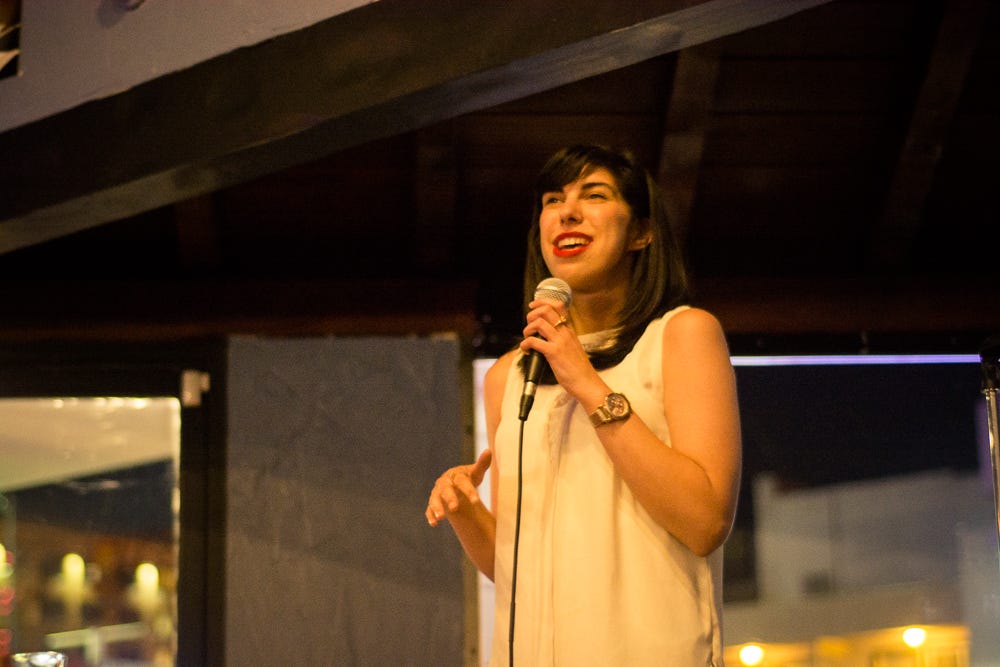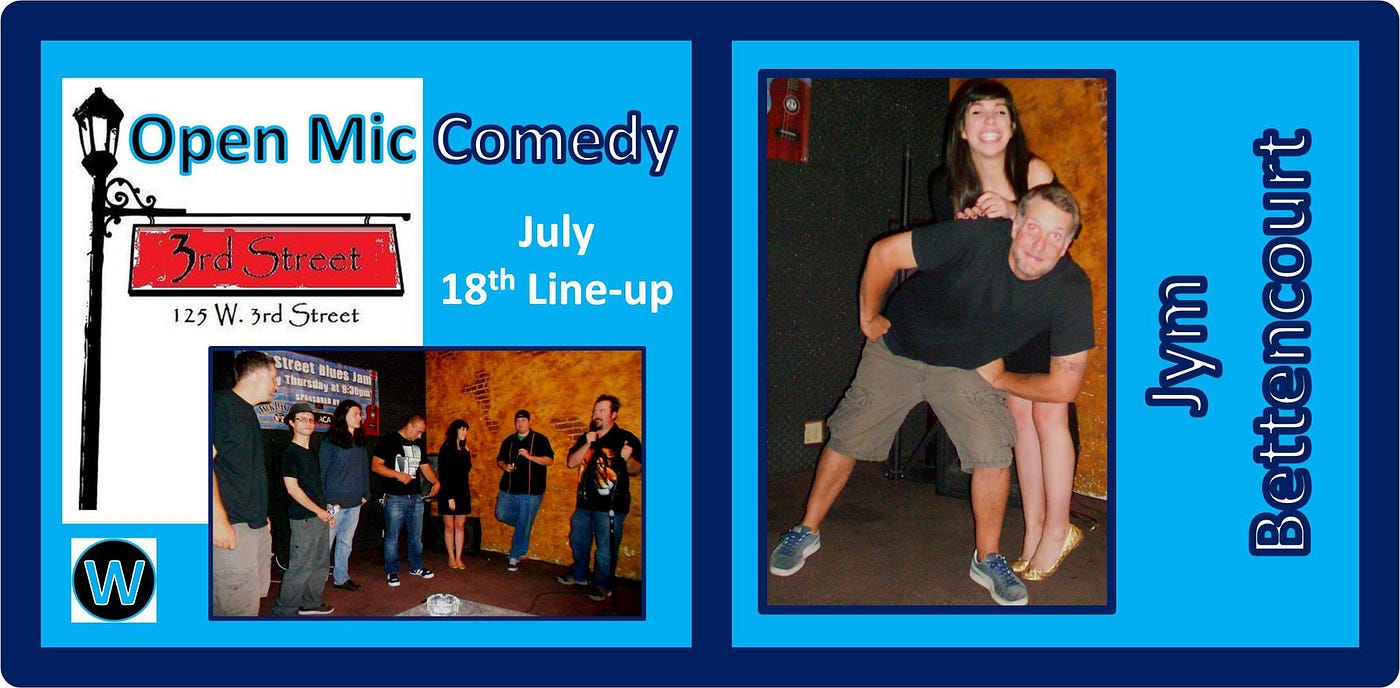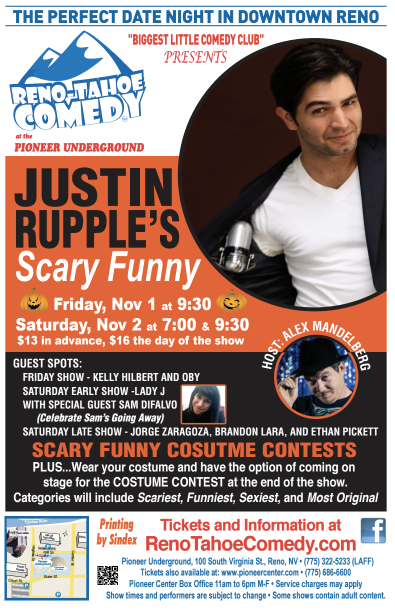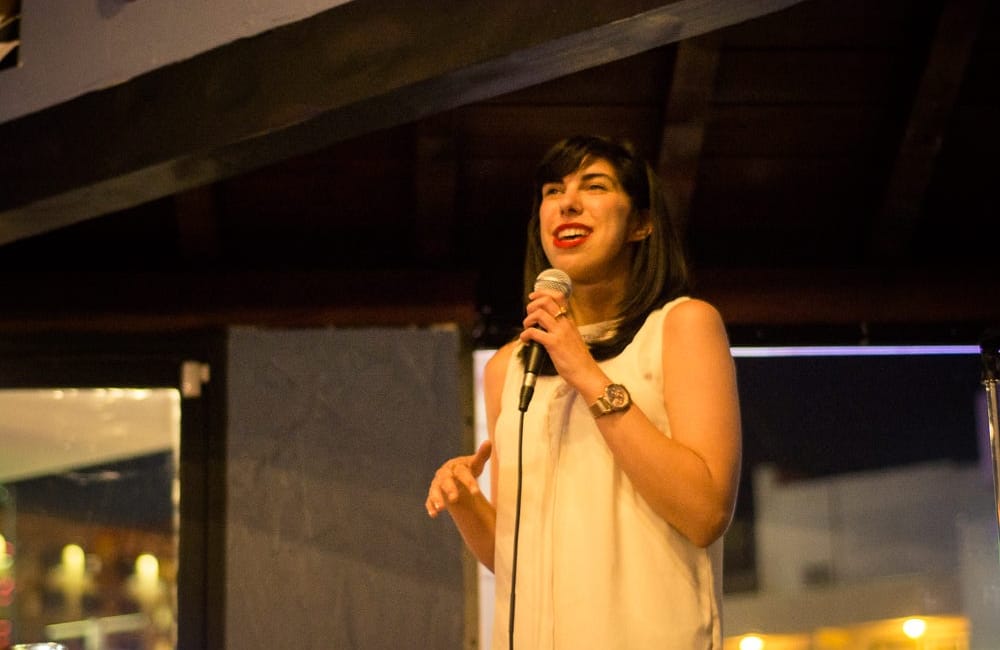
People who aren’t comics occasionally have this idea that the path to becoming a comedian is paved with yearbook Class Clown titles, a need to be the center of attention and a love of telling one’s own jokes when one isn’t onstage. The first two might be true for some comics, but it certainly isn’t for me. The last one is true for absolutely no one. Please stop asking comics to tell a joke on the spot. Comedy is still performance art and is best observed in its element. Sure, sometimes the element is a Laundromat, but that’s still better than reciting jokes in an elevator, as I try to prove to you that I do the thing I just told you I do. You wouldn’t ask a surfer to show you his or her moves in a nearby sink, so stop asking us to tell you a joke when there’s no mic or stage.
The typical class clown and I don’t have a lot in common. Up until college, I was someone who surprised people by talking. When I did, I was either discussing Ani DiFranco or Degrassi. I also once wrote a short story in the 11th grade about castration. All of this is widely agreed upon as being unfunny.
[Improv is] basically group therapy for people who were decidedly not cool in high school.
Then college hit, and I felt more free to express myself through my art. Still undeniably depressed, I took part in many a poetry reading and did improv both for credit and leisure. Though improv isn’t a clear indicator of depression, it’s an art form whose success is based on how well the people onstage agree with and encourage one another. It’s basically group therapy for people who were decidedly not cool in high school.
It only seems logical that I rounded out my Depressive Arts (English) degree by taking up stand-up during my final year in college. I had wanted to pursue stand-up since I started college but had felt too anxious, since I was used to the comfort of my improv troupe while onstage. I lurked at open mics like I was trying to catch a cheating lover. I would stand in the corner jealously, waiting to see if or when I’d feel impassioned enough to go up there.
My first time I did stand-up was also my first booked show, which is not how this normally goes. Most people’s first time consists of signing up at an open-mic night for sometime between half an hour to an hour before they go up. They do a shaky three to five minutes. They don’t die, so they do it again. In my situation, a local comic at my college announced a booked stand-up showcase to be hosted at our college’s theater. I signed up two weeks in advance. Here is the exact email I sent:
Hey,
I think I might do some standup on Friday, 10/21. It’s my first time and I’m pretty terrified.
It shouldn’t be more than 5 minutes.
Just writing to ensure a spot!
Thanks,
Sam
The confidence must’ve sold her, because I was booked. My two friends Charlie and Brian, who had also never performed comedy, passed the rigorous booking process, and we spent every night coming up with no more than five minutes of material. We all had a few premises that we thought would last at least five minutes, but when we performed for each other (with pauses for the inevitable howls of laughter), we each had around three minutes after our two weeks of labor.
I had invited my entire family, four of my close friends and my then boyfriend. I have no idea why I treated my first comedy show like I was releasing my memoir, but it clearly was a big deal for me — which is why I had agreed to get drunk beforehand with Charlie and Brian to calm our nerves. We each had a pitcher of beer during the hour leading up to the show, rehearsed our jokes, considered ordering pizza and then canceling before we told each other that we were all great and headed to the theater, where we sat with my parents and the rest of my entourage.
Bombing feels like you’re daytime TV — people are watching you with a blank expression, hoping something better comes on. It’s terrible and humiliating, and it can feel endless.
I don’t remember all of my set, but I do remember that I got laughs and was lucid the entire time. I believe I talked about having a hairy back and getting motorboated. Sophisticated stuff. We all did fairly well, and we would all go on to do comedy again, though at an actual open-mic night where I showed up two hours early, I overshot the pre-drinking ritual. I was standing long enough to perform for four minutes (an improvement!) and get some laughs, but then I had to carried out of the bar by my boyfriend.

The open-mic night after that — my third time performing stand-up — I finally full-on bombed a set. I say “finally” because every comic does it eventually. Some deny it, but they’re lying or delusional. I would go on to bomb many times after that. Bombing feels like you’re daytime TV — people are watching you with a blank expression, hoping something better comes on. It’s terrible and humiliating, and it can feel endless. I tried to escape bombing by not doing comedy as often, but that only made me less polished onstage, and it made bombing sting more since I’d go so long between performances.

When I left Reno for San Francisco, I bombed constantly, because the Bay has a higher bar for comedy, and there are more options for it. My peers in SF were getting up onstage twice a night, while Reno offered only a few mics a week. I scrapped all my jokes and went to mics for months before I had 10 minutes that would do well on most nights. When I bombed, I’d know I’d have the salvation of the next set. If I had never bombed, I’d still be talking about motorboating.
I recently rehashed my first time doing comedy with my mom. She remembers it well, and said to me, “You know, for a while, I was worried about what you’d end up doing” (I think she’s referring to the castration story). “When I saw you do stand-up, I knew, ‘This is it.’” Comedy is the refuge of the weirdos, an art that finds you when you’ve wrung out a few other options. If you’re lucky, it’ll outstay its welcome, forcing your friends to ask, “Are you still doing comedy?” every time they see you. You’ll reply with a worn “yep” and hope they eventually realize that it’s not a phase.







